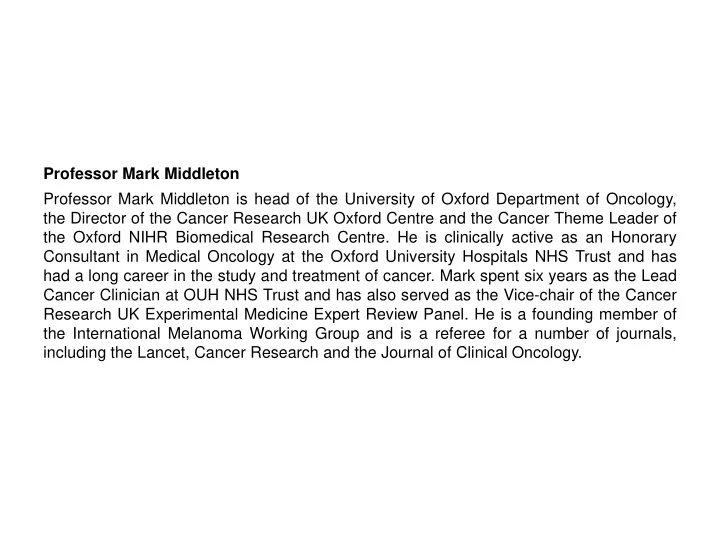

Professor Mark Middleton Professor Mark Middleton is head of the University of Oxford Department of Oncology, the Director of the Cancer Research UK Oxford Centre and the Cancer Theme Leader of the Oxford NIHR Biomedical Research Centre. He is clinically active as an Honorary Consultant in Medical Oncology at the Oxford University Hospitals NHS Trust and has had a long career in the study and treatment of cancer. Mark spent six years as the Lead Cancer Clinician at OUH NHS Trust and has also served as the Vice-chair of the Cancer Research UK Experimental Medicine Expert Review Panel. He is a founding member of the International Melanoma Working Group and is a referee for a number of journals, including the Lancet, Cancer Research and the Journal of Clinical Oncology.
Using Research to Achieve Excellence Mark Middleton Department of Oncology, University of Oxford
Disclosures • I have acted or act as a consultant for Amgen, Array, AstraZeneca, BiolineRx, Bristol-Myers Squibb, Eisai, GlaxoSmithKline, Immunocore, Lilly, Merck, Millennium, Novartis, Physiomics, Rigontec, and Roche • My institution has received research grants on my behalf from Abbvie, Amgen, AstraZeneca, Bristol-Myers Squibb, Celleron, Clovis, Eisai, GlaxoSmithKline, Immunocore, Merck, Millennium, Novartis, Pfizer, Regeneron, Replimune, Rigontec, Roche, and Vertex
Does research matter? It’s a side show Not rooted in ‘real’ practice Time consuming Takes advantage of vulnerable patients Expensive
Of course research matters There must be a better… WAY EXPLANATION TREATMENT Why?
Why research matters Protocols Training Quality Assurance Innovation Time Money
Immunotherapy is changing cancer treatment Mutational Burden in Human Cancers
Built on one hundred years of failure… Coley’s toxins Cytokines Vaccines/Antigens Monoclonal Antibodies Cellular therapies
2010 – Ipilimumab improves overall survival in melanoma
Immune-related side effects Endocrine - 8% Neurological Hypophysitis Meningoencephalitis Hypo/Hyperthyroidism Guillaun Barre Syndrome Adrenal insufficiency Diabetes Skin - 50% Eyes Rash/Pruritis Uveitis Vitiligo Conjunctivitis Lichen planus Cardio-respiratory Pneumonitis Liver/Pancreas - 10% Myocarditis Hepatitis Sarcoidosis Pancreatitis Kidney - 1% Nephritis Gut – 30-40% Haematological Diarrhoea Cytopenias Colitis/enteritis Clotting disorders Intestinal perforation Abdel-Wahab N et al. (2016) PLOS One 11: e0160221 Vesalius A (1543) De humani corporis fabrica libri septum
So why does this all matter? Current Configuration of Oncology Services Centralised, hospital based, hub and spoke Focus on cytotoxic chemotherapy Staffing, skillmix, training reflect this Non-oncologists only peripherally aware of immunotherapy
The Research Doesn’t Stop Integrating Immunotherapy Into The NHS What is the model for immunotherapy delivery? How do we manage toxicity? How do we afford it? How do we improve it?
What determines sensitivity to immunotherapy? Blank, et al Science 2016
Few biomarkers of response or efficacy • PD-L1 and response to immunotherapy in melanoma p=0.004 72 66 Response rate % p=0.0007 57 60 55 49 50 40 35 33 30 13 20 10 0 Pembro Nivolumab Nivo + Ipi Nivo + Ipi Daud, AACR 2014 Weber, JCO 2013 Kluger, ESMO 2014 Wolchok, ASCO 2015 (PD-L1 > 1%) (PD-L1 > 5%) (PD-L1 > 5%) (PD-L1 > 5%) PD-L1 + PD-L1 -
Few biomarkers of response or efficacy • Tumour Mutation Burden
What determines sensitivity to immunotherapy? Hugo, et al Cell 2016
Where next? TIM-3 Active immunotherapy LAG-3 Peptide vaccine PD-1 T cell checkpoint DC vaccine CTLA4 blocking and Genetic vaccine stimulating antibodies IL-2, IFN IL-15, IL-21 CD40 CD137 Soluble TCR OX40 Adoptive cell transfer Intra-tumoral immunotherapy immunotherapy T cell cloning TIL therapy Alpha-gal agonists TCR and CAR T cell therapy RIG-I antagonism Oncolytic virotherapy Adapted from Ribas and Blank, ESMO 2014
Novel immune therapies • Oncolytic viruses • ImmTACs • Immune modulators (e.g. IDO inhibitors) • Activators of innate immunity • Cell therapies
Dissecting cancer immunotherapy Adaptive immunity Cancer Inflammatory mutanome environment
Better immunotherapy • Novel agents tested in potentially curable cancer patients • Acquisition and detailed analysis of tumour and normal tissue • Link to potential surrogate tissue markers • Understand the biological effects of dosing • Ability to explain clinical results in other studies
Excellent immunotherapy • Acknowledge limitations • Understand who benefits • Learn from failure • Integrate with existing modalities
Research Delivers Excellence • A capable, inquisitive workforce • Focus on compliance • Protocol driven • Quality assured • Never satisfied with the standard of care
Oncology (Sandie Wellman, Nikki Hayward, Kath Room, Emma Johnstone, Sophie Reynolds, Nick Coupe, Victoria Woodcock, Miranda Payne) Pathology (Ruth Asher, Olivia Espinosa) Plastic Surgery (Oliver Cassell, Matt Potter, Andy Pay, Jeremy Birch,) Ludwig Institute (Colin Goding, Richard Lisle, Xin Lu) WIMM (Enzo Cerundolo, Giorgio Napolitano, Ben Fairfax) CyTOF (David Ahern) OCTO (Linda Collins, Sarah Pearson, Naomi Macgregor, Jen Houlden) Molecular Diagnostics Centre (Anna Schuh) Acknowledgements �
Recommend
More recommend